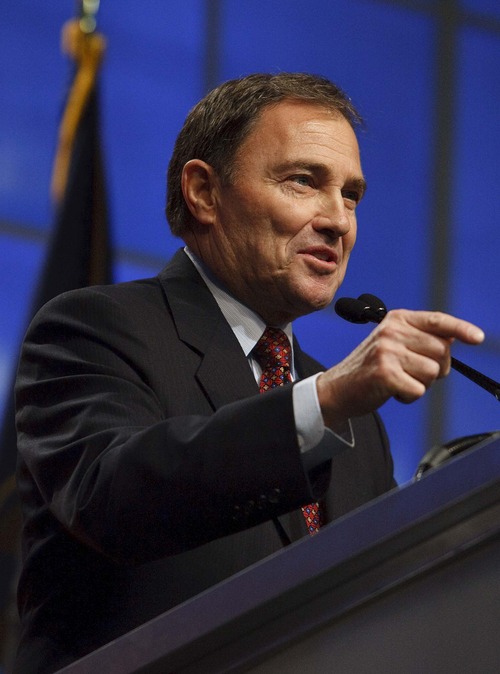This is an archived article that was published on sltrib.com in 2014, and information in the article may be outdated. It is provided only for personal research purposes and may not be reprinted.
Gov. Gary Herbert said Thursday that national attention on the armed brinkmanship by Nevada rancher Cliven Bundy with federal land managers could make Utah's fight to take control of federal public lands tougher.
"Cliven Bundy should not be the face for public lands issues in Utah," Herbert said at the governor's monthly news conference at KUED-TV. "Anytime you've got Americans lined up on one side and other Americans on the other side with guns pointed at each other, you've got a problem."
Herbert does not want such conflict to become the image in Americans' minds symbolizing fights over public lands, nor for Westerners to make him a hero. Instead he calls for rational leaders to sit down to work through issues.
Complicating matters more is a New York Times story on Wednesday that quoted Bundy telling supporters that blacks might have been better off in slavery than with current government subsidies that leaves many of them sitting on porches doing nothing.
"I have heard about the racist comments, which I think are based on ignorance, and are certainly despicable and offensive," Herbert said.
The governor said attention on Bundy comes just as Utah has some momentum in its move for control over more federal lands, as neighboring states are joining it and as he says the state has made progress with the Obama administration.
"We've been working very diligently, this Republican governor with a Democrat president, to see if we can in fact find that appropriate, balanced approach to utilization of our public lands," Herbert said, adding their relationship is better than some may think.
Herbert said what Bundy has demonstrated is the frustration by Westerners that their concerns about public lands often fall on deaf ears among federal land managers — and Bundy's brinkmanship may be akin to the old joke about the only way to get a donkey's attention is to hit it with a two-by-four plank.
But Herbert says he doesn't want to wield such a club, "and I don't want to get hit with it…. We should adhere to the rule of law, otherwise we have anarchy and chaos."
He said he worked to stop BLM plans to sell cattle it intended to round up from Bundy at an auction in Utah, fearing it could bring violence here.
"If those cows would have come into Utah, we probably would have had some rambunctious people that would have caused a little bit of mischief. That's why I didn't want them in here. You can't use us as a relief valve," he said.
Still, Herbert said several problems with federal management of lands shows that states may be able to do a better job.
For example, he said a U.S. Bureau of Land Management area in Iron County is "supposed to accommodate 300 horses. Now we've got 3,000 and they are doubling every three to four years — terrible management of the wild horses and burros."
He added, "We'd find a way to manage the population, which would mean taking down some of the horses. For the horse advocates, it wouldn't be popular at all. But, you know, we euthanize cats and dogs. We have to have a better, more aggressive spay and neuter program" and work on other solutions.
He said the state could conduct environmental studies more quickly to allow energy development and, "We'll find better efficiencies. We're close to the problem. We'll find better ways to manage. We'll probably have better cooperation from those who are out managing the land."
Herbert added, "We will always be a public lands state. The only question on the table before us is who is going to manage it — is it the federal government or the state? I think it will be a combination of both."
But, he said, "The state ought to have a larger say in what happens in our own backyard. We understand our ranges. We understand the fire problems."



